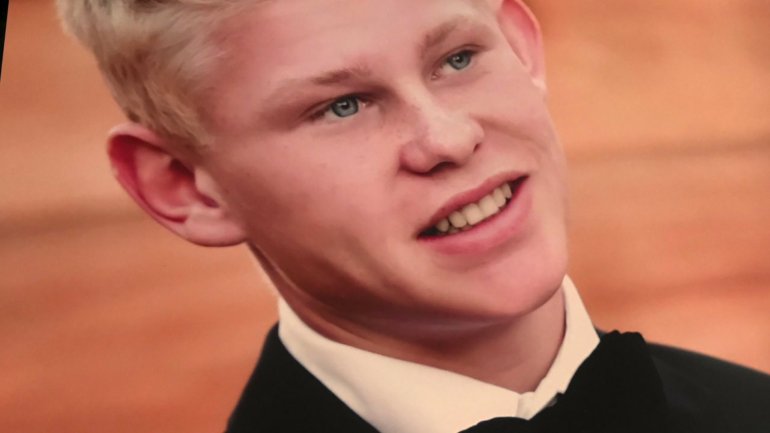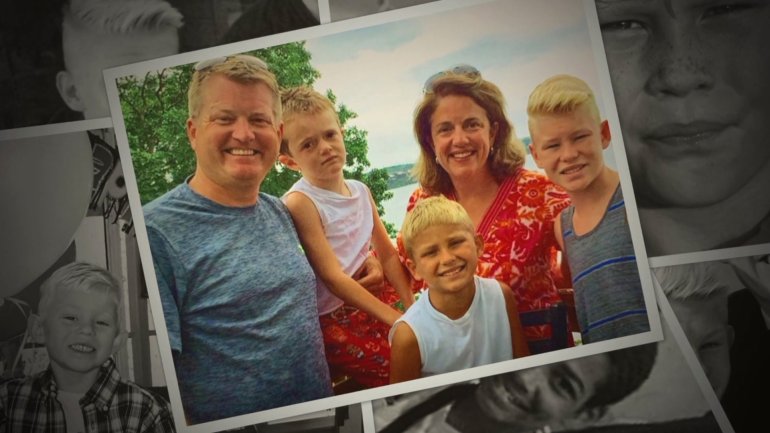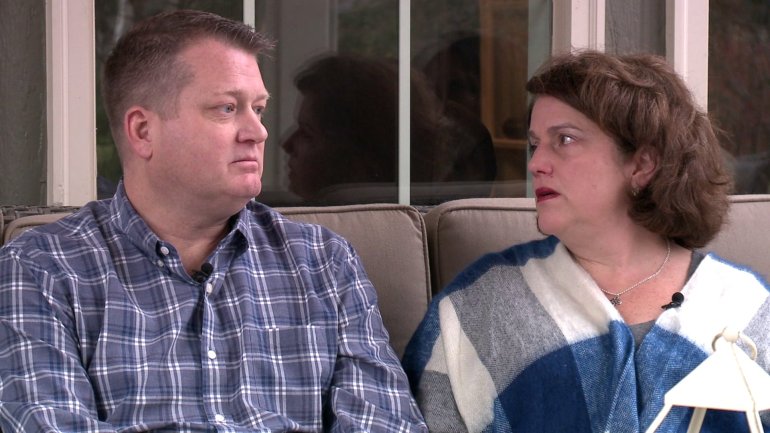OVERLAND PARK, Kan. — How did a call about a child in crisis escalate into a deadly shooting?
One local family is still searching for answers after an Overland Park police officer killed their 17-year-old son, who was threatening suicide.
Why did the officer fire more than a dozen bullets at John Albers, and why did Johnson County rule the shooting justified? FOX4’s Dhomonique Ricks uncovered information that reveals what really happened the night police shot and killed the teen.
For the first time, Albers’ family spoke publicly about their son’s death.
And in a rare interview, Overland Park’s chief of police discussed the officer’s split-second decision to use deadly force and changes the department made in the wake of this tragic shooting. The police chief said the shooting was justified, but Albers’ family said it certainly wasn’t.
“There are times that I forget sometimes for a brief second that he’s died. And I expect to look up and see him, and he’s not there. No parent should plan their child’s funeral,” mom Sheila Albers said.

“I had his graduation party planned in my head. Not his funeral.”
She said the unimaginable pain and grief will never expire.
“The hole is so enormous I can’t even describe it,” she said.
On January 20, 2018, she became the mother of an angel. She lost a life she loved more than her own.
“Sometimes I hear him. I hear his laughter. I love that one because he was just having a ball. He was so happy,” she said while looking at pictures of the teen.
A haunting night
John was shot and killed while backing out of his driveway.
“The officer fired 13 times at my son. Clayton Jenison used excessive force. He ended my son’s life,” Sheila said.
Three police cameras and a neighbor’s doorbell camera captured the deadly Overland Park shooting, a shooting the Albers believe never should have happened.
“I am disgusted by the complete lack of being forthcoming with information,” Sheila said.
Johnson County District Attorney Steve Howe released two of three videos; both were edited down. See the footage in the video player below.
Just after 5 p.m. on January 20, 2018, Sheila, her husband Steve and their two younger boys went to dinner. Sheila said John was crabby and didn’t want to go, but showed no signs of the emotional distress that was to come.
“There was no sign that I shouldn’t have left the house that night,” she said.
It’s a night and a decision that haunts her family. Barely 30 minutes later, John’s friends called Overland Park police, worried he was threatening to hurt himself.
“He made suicidal ideation comments on social media that night,” Sheila said.
Her phone lit up.
“Something bad has happened. John is not safe. I just remember, and I looked at Steve and was like, ‘We have to get out of here,'” Sheila said. “I bolted out of the car, and I started to run towards my home and an officer stopped me. And I said, ‘Is my son OK?’ And he said, ‘He’s passed,’ and I fell to the ground. I thought, ‘What do you mean he’s passed?'”
It wasn’t until the next day police told his parents John died by gunfire.
“We looked at them and said, ‘We don’t own firearms. What do you mean? Who shot him?'” Sheila said. “‘We can’t tell you that.’ ‘How many times was he shot?’ ‘We can’t tell you that.'”
Weeks turned to months, and no peace.
Here’s what they do know: The first officers arrived on scene with no sirens, no lights. That’s standard, but for several minutes police didn’t knock on the Albers’ door to check on John.
Video shows former Overland Park Police Officer Clayton Jenison standing to the side of the Albers’ garage door, beside a tree. His gun was unholstered. The garage door went up, the brake lights went on, and John began to slowly back out.
Then chaos erupted.
“Stop! Stop! Stop!” you can hear on video before two shots were fired. The van made a sudden turn, and the officer fired 11 more bullets before the van rolled into a neighbor’s yard and stopped. Six bullets hit John.
The autopsy revealed John was not on drugs. His blood alcohol level was about the equivalent of having a beer.
‘Dark moments’
Steve and Sheila Albers invited FOX4 to their home to speak about John’s death.
“He was my first son. He will always be my first son,” Steve said.
In May 2002 — Steve and Sheila traveled to Russia and brought home a beautiful, blue-eyed 18-month-old boy.
“He was just having a ball. He was so happy,” Sheila said.

John had a passion for sports, especially soccer, nature, and the rush of winning in competition. His parents say he lived and loved fearlessly.
When John turned 13, his parents saw a change.
“Towards the end of eighth grade, I think he really started to grieve the loss of knowing his biological parents. He had ‘dark moments’ in the sense of struggling with who he was and who he wanted to be,” Sheila said.
It led to some run-ins with police over a three-year period and emotional breakdowns.
Police had been called to the Albers’ home prior to the night John was killed, and the same day he died, John was suspected of trying to shoplift from a sporting goods store.
“The night John was killed he hit one of those moments of emotional distress, most definitely,” Sheila said.
Ruling it justified
“It doesn’t make anybody feel good — making these decisions, but we have to do it based on the law and evidence and not emotion,” Johnson County District Attorney Steve Howe told FOX4.
One month after the shooting, Howe cleared the officer and ruled the shooting “justified” based on Kansas’ “Stand Your Ground” law.
“It was reasonable for the officer to believe that his life was in jeopardy, and the use of force under the laws in the state of Kansas was justifiable,” he said.
“Officer Jenison fired his gun 13 times. Is that excessive force?” FOX4’s Dhomonique Ricks asked.
“The law says that it is proper for a person to use deadly force to protect themselves from a vehicle coming at them,” Howe replied.
“In the video you hear Officer Jenison say, ‘Stop, Stop, stop.’ Two shots are fired, ‘Stop, stop the car.’ We never hear him say, ‘This is Officer Jenison, police.’ We never hear him identify himself. Is that cause for concern?” Ricks asked.
“I think it’s easy to second-guess that very moment. I will say that the officer was a uniformed police officer,” Howe replied.
Overland Park Police Chief Frank Donchez, speaking publicly for the first time about the shooting, also defended his officer’s actions.
“Did Officer Jenison make any mistakes?” Ricks asked.
“Officer Jenison followed policy, and by Steve Howe’s account, he followed Kansas criminal law,” Donchez said.
“Was Officer Jenison ever reprimanded?” Ricks asked.
“He was not,” Donchez replied.
“Was he ever encouraged to leave the force?” Ricks asked.
“He was not,” Donchez said.
Jenison resigned shortly after the shooting and still holds a law enforcement license. The chief said Jenison had to make a split-second decision.
“There’s a lot that goes into that in the heat of the moment,” Donchez said.
“He fired his gun 13 times. Is that excessive force?” Ricks asked.
“Not by the state statute and not by our policy,” he replied.
The police chief said the teen posed a threat to the officer and the community, describing the van as a weapon.
“Was Officer Jenison ever in the way of John Albers’ van as he was backing out of his garage,” Ricks asked.
“I think the video speaks for itself,” Donchez replied. “I think that Officer Jenison believed that he was in danger, and that’s why he took the response that he took. And that was in line with the way the policy was written at that time and quite honestly the way it’s written now.”
A push for transparency
Donchez refuses to release a report detailing the internal investigation of the shooting and other records FOX4 requested. They’re documents the family also requested but has never seen.
He did disclose, for the first time, policy changes made in the wake of John’s death.
“I think the most important addition to our policy is to specify that all reasonable means of defense be exhausted to include moving out of the path of the vehicle. I think that’s probably the biggest takeaway in the new part of our policy is that we’re encouraging officers if possible to move out of the way,” he said.
That change is news to the Albers, who filed a wrongful death lawsuit last April, in part to get answers about their son’s shooting.
“From Jan. 20 to April 17, I still held out some hope that someone was going to do the right thing,” Sheila said.
This January, Overland Park settled that lawsuit for $2.3 million. The deal came after a federal judge ruled Jenison’s action was “unreasonable.”
“In my opinion, truth is priceless, and my son’s life is priceless. If the truth is not told and John’s story is not shared, it will happen again,” Sheila said.
Transparency isn’t the only change the Albers want to see.

They, along with members of the community, have formed an organization called JOCO United. Their focus: a community partnership with police and more thorough crisis intervention training to ensure officers know how to respond to people facing a mental health crisis.
Donchez submits that even if an officer with crisis training had responded that night, the outcome might not have been any different.
“I think that’s another misnomer in the CIT training, or in people looking at CIT training. Most of what CIT training talks about is actually engaging with the person. In this case, the officers on the scene never even got to talk to John Albers,” he said.
“Do you have anything to say to Steve and Sheila Albers?” Ricks asked the police chief.
“I wish that Jonathan Albers was still alive. I hope that though this incident and their work with Johnson County United, and shedding light on mental health issues — I hope that families in this county, in this state, in this country, continue to get the help and resources they need to deal with mental health crisis,” he replied.
The Albers will continue to fight for government transparency, CIT training and resources for those struggling with mental health issues or emotional distress. It’s their legacy to John.
“If you could say anything to Officer Jenison today, what would it be?” Ricks asked Sheila Albers.
“I wouldn’t because I think that is between, that is between Officer Jenison and God,” the Overland Park mom said.
A mother and father’s grief, as timeless as their love. It’s a love and a bond that death cannot part.
“He will always be my son. He will always be with me,” Sheila said.
The family said they’re still haunted by a lifetime of wonder. Wonder from their youngest son, who has so many unanswered questions.
“More for Patrick than Tommy is he can’t understand why nobody got in trouble for what happened to John. And I don’t know how to answer that,” Steve Albers said.
Jenison resigned as an Overland Park police officer six weeks after the deadly shooting. FOX4 has confirmed Jenison is still certified and could work in law enforcement again.
With the lawsuit behind them, Steve and Sheila Albers are focused on supporting JOCO United. Concerned citizens formed the group after John’s death. The goal of JOCO United is to promote transparency from cities and counties.
They also want to see higher levels of mental health training for first responders to avoid the kind of tragedy that took John Albers’ life.
If you are having suicidal thoughts, we urge you to get help immediately.
Go to a hospital, call 911 or call the National Suicide Hotline at 1-800-SUICIDE (1-800-784-2433).









